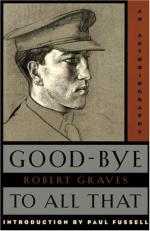|
This section contains 430 words (approx. 2 pages at 400 words per page) |

|
Good-Bye to All That has been regarded, since its first publication in 1929, to be one of the most sincere books written about the Great War. Its sincerity, though, is an artistic sort of sincerity that was not always appreciated. As Steven Trout put it in an essay comparing Graves' form of "truth" with Daniel Defoe's nearly two hundred years earlier, critics judged books about the war "according to their perceivable 'facts'whether a writer had accurately related the details of a particular battle, for example, or whether he had presented a supposedly isolated incident, such as drunkenness among officers, as a common occurrence." By these standards, Good-Bye to All That was a weak and deeply-flawed narrative. The 1920s were a time of artistic revival, though, with literary theorists recognizing the fact that pure objectivity is nearly impossible. The writer is not a camera, and a work...
|
This section contains 430 words (approx. 2 pages at 400 words per page) |

|




